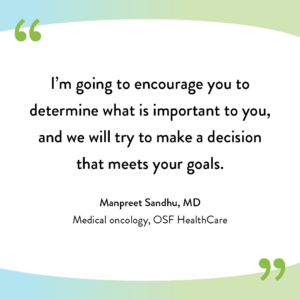
Self-awareness plays prominent role in cancer treatment
When you get diagnosed with cancer, a herd of questions stampedes into your mind.
Am I going to live? How long? Is it curable? Can I get a second opinion? What are the treatments? What are the side effects? All of these and more, you’ll ask your provider.
But there are important questions you also should ask yourself before making cancer treatment decisions. The answers can play a significant role in determining your treatment plan and, ultimately, how your survivorship journey unfolds.
“Ask yourself, ‘What is important to me? What are my goals? What are my priorities? How should I make every day count?’” said Manpreet Sandhu, MD, a medical oncologist and hematologist at OSF HealthCare.
Your answers to these questions will help you define yourself, as opposed to letting the cancer define you. This is an important part of taking care of your mental and emotional health.
When you know yourself and are tuned in to what you want, your doctor can use the information to help build your treatment plan. Knowing yourself and what you want also can help you maintain the focus necessary to get through the roughest parts of your treatment.
Individual cancer treatment goals can vary
Cancer treatment has evolved from the days when doctors made all the decisions. Today, you are encouraged to ask questions, arm yourself with as much information as possible and become actively involved in deciding your treatment plan.
“If somebody says, ‘You’re the doctor, you tell me what I should do,’ I give them statistics. And I say, ‘This is what you can expect, based on the statistics,’” Dr. Sandhu said. “I want you to have all the facts on the table. I am not going to impose my wishes on you.
“I am going to encourage you to determine what is important to you, and we will try to make a decision that meets your goals.”
The goals of cancer treatment vary from one person to another.
One person might want to do whatever is necessary to extend their life, even if it means receiving treatments that will leave them feeling ill a lot. Another person might prefer to avoid treatments with severe side effects in order to remain physically active, even if that shortens their life expectancy.
Perhaps a grandson or granddaughter has plans to be married next year. One person might want to assure being able to attend the wedding, while another might be inclined to spend more high-quality time with that family member now.
“Once you come to grips with what’s most important to you, it’s easier on all parties,” Dr. Sandhu said. “As the physician, I can treat you according to what you want. You know this is what you chose. And it helps the caregivers in your family, because they know this is your choice.”
Decide what’s right for you
Some of your cancer decisions will be driven by the type of cancer you have. Is it aggressive or slow growing? What stage is it in? Is it curable, or will it have to be managed more like a chronic disease? Will the cancer or the treatment prevent you from working, and if so, for how long?
Ultimately, though, you need to recognize who you are and what’s most important to you and your loved ones.
“There are quality-of-life questions. Treatments may prolong my life, but will my life have quality? How functional will I be? Will I be sick all the time? Is it worth it?” Dr. Sandhu said.
“Think about your priorities, what’s important to you. What are your relationships? What is your family dynamic? Do you want to continue working, or should you go on disability or retire so you can spend more time with your family? Do you take a big vacation trip, or stay close to home?”
Treatment with mental peace
One important factor to consider in your self-examination is what gives you mental peace. The better your state of mind, the better you will be able to handle your journey.
Get your own copy of the Know Yourself worksheet
“If your mind is feeling good, you’ll eat better, be more physically active and you might be able to fight the side effects better,” Dr. Sandhu said. “Positive thinking doesn’t necessarily extend your life, but it helps you have a better quality of life. If your apprehension is under control, the time you have becomes more meaningful and enjoyable.
“Set realistic goals, and you can feel a sense of achievement and accomplishment. The goals you set might not always be achievable, but they will focus your purpose. And that’s good.”
